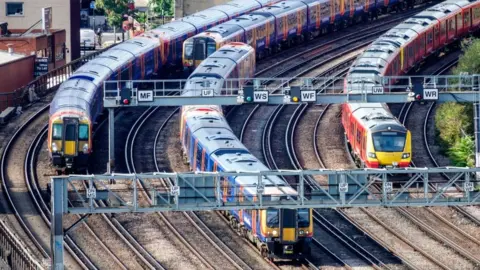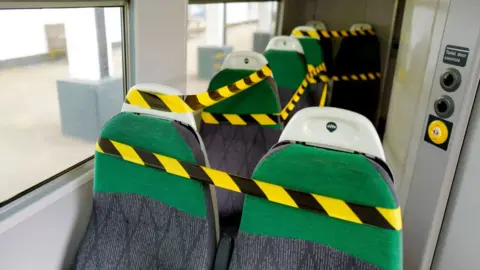Rail fare rise a ‘kick in the teeth’ for passengers
 Getty Images
Getty ImagesRail fares will rise more than expected next year - although the new inflation-busting 2.6% increase is being delayed until 1 March.
Regulated fares were expected to increase by 1.6% in January, as successive governments linked annual rises to July's RPI inflation rate.
Rail minister Chris Heaton-Harris said the rise reflected "unprecedented taxpayer support" for rail this year.
But unions said the rise was a "kick in the teeth" for passengers.
An average increase of 2.6% across all fares will still be the lowest since 2017, and it will only last nine months, until the end of 2021.
Had the rise come in in January it would have equated to a 1.95% jump across the whole year.
Until 28 February season tickets holders can renew at existing prices and the cost of daily fares will stay the same.
'Keeping services running'
Rail travel has been badly hit during the coronavirus crisis, and Mr Heaton-Harris said delaying the price rise from January "ensures passengers who need to travel have a better deal this year".
Regulated fares make up about half of fares and include season tickets on most commuter routes. But operators are expected to match their rises for unregulated fares.
It means, for example, a Brighton-to-London annual season ticket going up by about £129 to £5,109, and a Manchester-to-Glasgow off-peak return rising by £2.30 to £90.60.
The rail minister said: "By setting fares sensibly, and with the lowest actual increase for four years, we are ensuring that taxpayers are not overburdened for their unprecedented contribution, ensuring investment is focused on keeping vital services running and protecting frontline jobs."
The government took over rail franchise agreements from train operators in March, following the collapse in demand for travel caused by the virus crisis. This is expected to have cost about £10bn by mid-2021.
The rise will help recover some of the significantly increased costs met by taxpayers to keep services running during the pandemic, Mr Heaton-Harris said.
'Extortionate'
Jacqueline Starr, chief executive of the Rail Delivery Group, representing train operators, acknowledged that "passengers will be disappointed" about the fares rise, adding that "governments must ultimately decide the balance between how much farepayers and taxpayers pay to run the railway".
She added that industry was committed to working with the government to make the fares and ticketing system easier to use.
 Getty Images
Getty ImagesThe department has written to all operators telling them to begin immediate work on developing flexible season tickets, allowing people who travel two or three days a week to save money compared with buying daily tickets. Firms have been told these must be introduced across England by the end of next year.
Anthony Smith, chief executive of consumer watchdog Transport Focus, said: "This fare increase makes it even more important that, when travel restrictions start to be lifted, the industry is able to attract people back by offering fares that match how we know people hope to live, work and travel in future."
Union leaders condemned the rise, with Manuel Cortes, general secretary of the Transport Salaried Staffs' Association calling it a "kick in the teeth for passengers".
He continued: "Ministers are well aware that millions have suffered this year with the uncertainty of employment, a changing picture on furlough provision, pay cuts, wages freezes and lost jobs. So, to reach for a hike in fares of this size is both extortionate and plain daft."
Mick Cash, general secretary of the Rail, Maritime and Transport union, said ticket prices were being "forced up to subsidise private profit. The time is right for a publicly-owned railway system that delivers reasonable fares for our people as the public and the economy tries to recover and shake off the Covid crisis next year."
Update 8 January 2021: This story has been amended to remove an example of a season ticket price increase faced by one passenger. The example of a first class ticket was considered to be unrepresentative of the situation faced by the average commuter.
